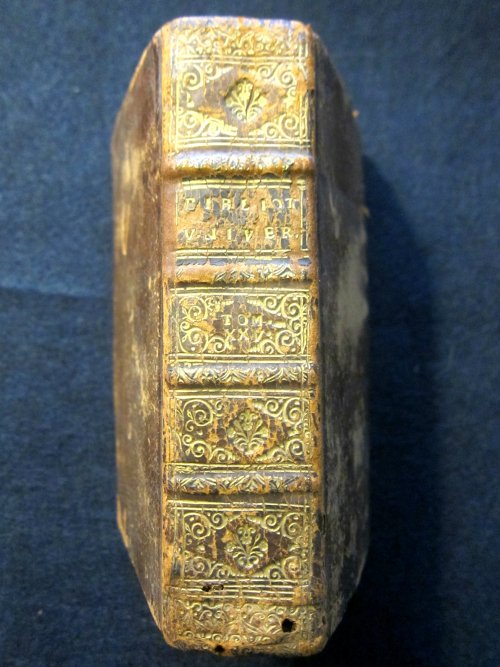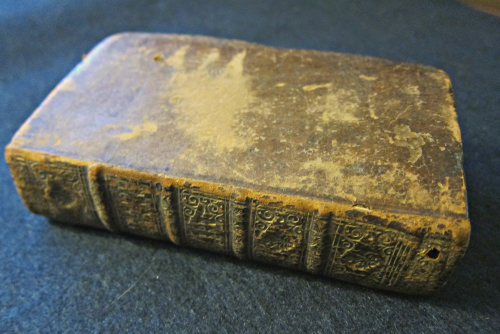Gottfried Leibniz, "Codex Juris gentium Diplomaticus, in quo tabulae Authentica Actorum Publicorum Tratatuum...", appearing in Jean Le Clerc and Jean Cornande de al Crose, Bibliotheque Universelle et Historique de l'annee M.D.C. XCIII Amsterdam, Abraham Wolfgang, 1693, volume 25, occupying pp 1-21. First edition. The volume printed in two parts, vi,279,(2),281-539,(25)pp. 130x75mm, the article occupying pp 1-21, this issue with the Leibniz published in July of that year. Condition: Bound in leather, with raised bands and decorated spine panels. The book is fairly rubbed, and has two worm holes at spine bottom; there is also some marginalia and annotation on the front pastedown and free fly. That said the book is sturdy and the text is generally clean and crisp throughout. A solid GOOD copy. $350

- Also bound with:
Leibniz, "De La Tolerance Des Religions: Lettres de M. de Leibniz, Et Reponses de M. Pellisson”, pp 21-34.
First paper: “In 1693 Leibniz published a large collection of medieval documents supporting the position of the Empire against the claims of the French. To this collection he attached a preface, about half of which is translated below. In it Leibniz showed that he was moving a little away from his earlier view that the Republic of Christendom could be restored, and toward a more modern position which accepted the existence of independent national states. But the most important part of the preface is that containing an excellent statement of his general theory of justice as the charity of the wise, which he attempts to relate to international principles. There are also a great many observations about the psychology of rulers which show that Leibniz could, when he liked, be fairly ‘realistic’.--from the work of editor Patrick Riley, Gottfried Wilhelm Leibniz, (Cambridge UP) the section on the preface of the ”Codex Iuris Gentium, (1693).
“Justice is the charity of the wise, or what is congruent with the judgment of the good and prudent person; or it is the virtue of the affection of one person toward another, that is, the benevlolence as well as the aversion, moderated and directed for the right reason.” --(quote from Christopher Johns, The Science of Right in Leibniz's Moral and Political Philosophy, p. 71)
There are numerous other papers in the volume, including book notices, book "reviews" (such as a presentation on Guillaume Sherlock's book on death and the final judgment), philosophy, history, ethics, and others that don't fit neatly into a category. (A good example of the last entry is a review of Pierre le Lorain Abble de Vallemont's odd book on diving rods and etc. which translates roughly to "Occult Physics, or the Treatise of the Divine Wand and its Use in Discovering Water Springs, Mining, Hidden Treasures, Robbers and Fugitive Murders. With principles that explain the darkest phenomena of Nature...." which appears on pp 269-279.)

On the Bibliotheque: “Like its great rival, Pierre Bayle’s Nouvelles de la re´publique des lettres, it [the Bibliotheque...] was a source of information and means of communication for members of the nascent Republic of Letters. It was also one of the remote ancestors of the modern academic journal, though much less specialised than most of its successors.”J.R. Milton, “Locke's Publications in the Bibliothèque Universelle et Historique”, British Journal for the History of Philosophy, 05/2011, Volume 19, Issue 3
Note: editors and contributors of the Bibliotheque from start to finish included: Jean Le Clerc et Jean Cornande de al Crose, vols 1-9; Jean Le Clerc, 10, 12, 14-19; Jean Cornand de La Crose, vol 11; Charles le Cene and Jean Le Clerc, vol 13; Jacques Bernard and Jean Le Clerc, vol 20; Jacques Bernard, vols 24-5. The journal was published every 4 months in vols 1-3; every 3 in 4-19, and then twice a year for 20-25.




Comments